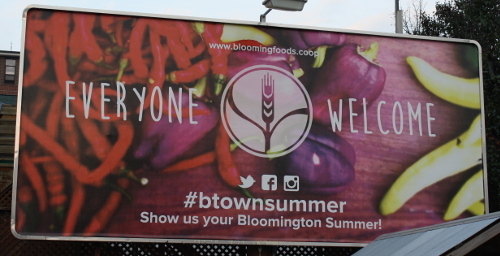I’ve shopped a lot at Bloomingfoods over the last 4 years. When I first started
shopping there, I assumed the prices were higher because the employees were
well cared for.
Over time, I realized that wasn’t really the case. My last article, told the
story of my general disillusionment with Bloomingfoods. One of the concerns I
mentioned was the lack of a union or employee representatives on the Board of
Directors.
It seems that Bloomingfoods employees have decided to rectify the lack of a
union part.

I’m generally supportive of the right to unionize. Sure, unions have their
problems, but what organization of people doesn’t? Unions are a tool with which
workers can advocate for themselves. They provide workers protections in
dealing with those who have power over them and give them a strong voice in
their workplace. A strong voice they can use to improve that workplace.
So I was pleased to hear about the union organizing drive. I was really hopeful
that the Bloomingfoods administration and Board of Directors would use this as
a wakeup call. Hopeful that they would respect the push and take advantage of
the possibility it offers for additional systems of accountability with in the
co-op.
Imagine my disappointment when I heard that the administration had secretly
hired a union busting lawyer.
That Has To Be Just A Rumor
At first I was skeptical. I tried to convince myself it was just one of the
many overly hyped rumors that have been flying around.
I had the name of the firm, so I decided to do some research. I did a search
for the name, Barnes and Thornburg, and “union avoidance”—a poor euphemism for
“union busting”, but one that seems to have come in to wide use. Low and
behold, right there on their website, I found this.
A union flyer was posted on one of your facility’s employee bulletin board last night. What should you do next?
Fortunately, you don’t have to know the answer—because we do. We have the experience, depth and understanding to deal with any situation at a moment’s notice. We will get you through this – our professionals have worked with employers from coast-to-coast, across most industries and with most of the major unions. Our passion is to preserve a client’s freedom to manage and to assist our clients in helping them remain union-free.
Emphasis mine.
My jaw dropped. I hadn’t expected them to be quite so blatant about it.
From further down the page I found this bit.
An effective union avoidance strategy involves a number of other components, including:
[ … ]
Rapid Response Capabilities. We have been called in by clients to manage rapid responses to organizing activities and have prepared our entire team with campaign management tools that allow us to quickly address union organizing activities in the event of any card-signing or other union activity.
It’s pretty hard to argue that this isn’t a firm you hire when you want to
fight a union organizing campaign. They all but say, “Call us and we’ll help
you to remain union free!”
My immediate next thought was “Bloomingfoods cannot have hired these folks, and
if they did, the board cannot possibly know about it or have approved it.”
So I reached out to Tim Clougher, the board president. I quoted him the same
things I’ve quoted here and linked him to that web page. “Folks involved with
the union push are now saying that George placed the law firm Barnes and
Thornburg on retainer. Can you please confirm or deny this?”
It took him a little while to get back to me, but when he did, I found myself
deeply disappointed by his answer.
Thank you for getting in touch and voicing your concerns to us! Like you, we really care about our Co-op, the employees, the members and our community. We recognize the rights of co-op employees to consider whether they want to join a union or refrain from joining a union. We are resolved to respect co-op employees’ decision on this issue, whatever it might be. Federal law imposes numerous requirements designed to ensure that the process of contemplating a union is free of improper influence. We are committed to making sure the law is followed. We are in the process of learning as much as we can about this situation and our role in this process in order to best represent our members.
We appreciate your continued communication and support in this effort.
On behalf of the BCS Board,
Tim Clougher-President
That’s not an answer.
Just to be sure, I casually asked a former labor lawyer that I happen to know
and she told me, with the usual disclaimer that this wasn’t legal advice, that
there was no law she knew of that would prevent the board from answering my
question. Nothing to prevent them from publicly stating the name of the firm or
firms they were working with.
There are two possibilities here.
In the first, they are deliberately refusing to answer the question in order to
avoid a member-owner backlash. I will only say, that when one finds oneself in
a public service position—as serving on the board of a co-op is—wanting to keep
something secret for fear of the ire of those you serve, well that’s a darn
good hint that you shouldn’t be doing that thing in the first place!
The other possibility is that Tim, the board president, was unable to get a
hold of George, the General Manager, to get a yes or no answer to my question
in the 26 hours it took him to get back to me. Personally, I think this is
unlikely, but should the board plead lack of knowledge, I will only say that it
makes me question their ability to provide adequate oversight of the
Bloomingfoods administration.
A strong employee union would help in that regard, by the way.
Confirmation
At this point, I have confirmation from one of the union organizers that
Bloomingfoods has consulted with one Nathan A. Baker of Barnes and Thornburg.
I’ll quote a relevant section of his publicly posted profile.
His labor relations practice has also included all aspects of traditional labor law. He has represented management in union-free training, arbitration hearings, unfair labor practice charges before the National Labor Relations Board and union organizing drives and counseled clients through strikes and lockouts. Nathan also represents employers in collective bargaining negotiations as well as in resisting union organizing attempts.
He represents employers in “resisting union organizing attempts.” Is there a
clearer way to say “he helps employers bust unions”? This is what a modern
union buster looks like. They aren’t tough goons with sticks anymore (most of
the time). They’re lawyers.
The biggest problem with the co-op hiring one of these guys is that it makes it
impossible for us to give the board and the co-op’s admin the benefit of the
doubt.
Plausible deniability is these union avoidance lawyers’ bread and butter. The
whole reason they can do what they do is that they are experts at staying in
the grey area just inside the red line—or at dancing over it in ways that are
very hard to trace back to them.
If we, as member owners of the co-op, truly respect the right of Bloomingfoods
employees to consider unionizing, then we cannot allow the administration to
continue to consult one of these lawyers.
I really want to believe Tim when he says, “We recognize the rights of co-op
employees to consider whether they want to join a union or refrain from joining
a union. We are resolved to respect co-op employees’ decision on this issue,
whatever it might be.” But as long as Bloomingfoods is consulting a lawyer who
specializes in “resisting union organizing attempts”, I can’t.
The egregious lack of transparency only worsens this state of affairs.
The Way Out
I want to give the Bloomingfoods board and administration staff the benefit of
the doubt. But so long as they are following the classic union busting playbook
by secretly hiring a union avoidance lawyer, and so long as they blatantly
dodge my requests for transparency in the matter, I cannot.
I have to assume they’re following the union busting playbook intentionally,
because the first line of that playbook is “Maintain the appearance of
respecting the worker’s right to organize.” Every other line in the playbook is
about undermining that very right. It’s the most divisive and deceitful
playbook out there and is wholly unbecoming of a cooperative.
So, Tim, Bloomingfoods board and administration staff, if you want to win back
my trust and repair some of the damage you’ve done in the last few weeks,
here’s what you can do.
Start by being transparent. Publicly state whether you’ve consulted with,
retained or hired Nathan. Clarify his role in your deliberations and the nature
of those deliberations.
Next, fire him. A union avoidance lawyer has no place in a cooperative
environment. There are many lawyers who can advise the co-op as to the legal
intricacies involved in this process who refuse to engage in any sort of union
avoidance. These are lawyers who we, as member owners, can trust to provide
truly neutral, objective advice to the co-op. I know some local labor
supporters who are currently assembling a list of such neutral lawyers. If the
board doesn’t have it already they should have it shortly.
Finally, maintain transparency through out the rest of this process. Be open
and honest with us about your worries with respect to Bloomingfoods unionizing.
Tell us what your lawyers are telling you. Give the union organizers a chance
to respond. Allow us to have a truly objective, open air and cooperative
discussion about the benefits and pitfalls of unionization.
Then stand back and let the employees make their decision.
Please, allow us to deal with this as a cooperative and not adversarially as
labor supporters fighting an untransparent corporation.


